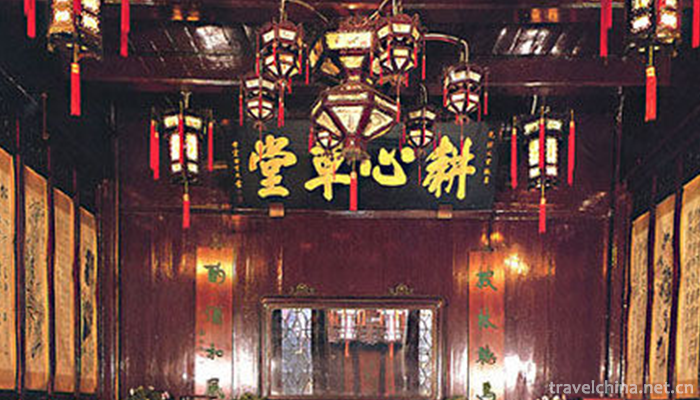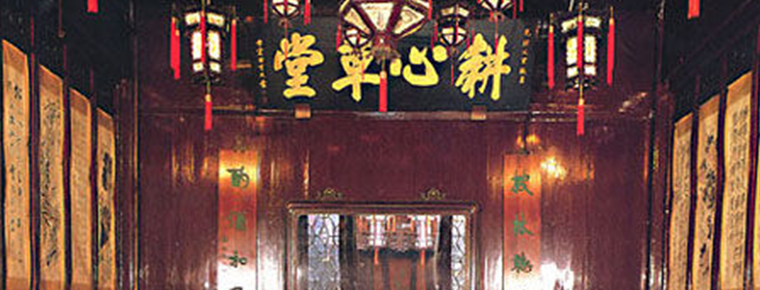Hu Qingyutangs Traditional Chinese Medicine Culture
Hu Qingyutangs Traditional Chinese Medicine Culture
Hu Qingyutang's traditional Chinese medicine culture is one of the national intangible cultural heritages and the traditional trade customs preserved by Hu Qingyutang.
Hu Qingyutang's traditional Chinese medicine culture mainly includes the culture of "abstaining from deception". "Quitting deception" is Hu Qingyutang's shop motto, written by Hu Xueyan himself. Over the past 130 years, Hu Qingyutang has always adhered to the principle of "abstaining from deception", adhering to traditional Chinese ethics and culture, and formed a business philosophy and store rules with the connotation of "abstaining from deception". This concept has the characteristics of transcending the enterprise level and advocating social morality.
On May 20, 2006, Hu Qingyutang's traditional Chinese medicine culture was approved by the State Council and listed in the first batch of national intangible cultural heritage list.
historical origin
Hu Qingyutang, the "King of Jiangnan Medicine", is a pharmacy founded by Hu Xueyan, a "Red Top Merchant" in 1874 (thirteen years of Tongzhi reign in Qing Dynasty). It is located in Qinghefang, Hangzhou. From Linan (now Hangzhou), the capital of Southern Song Dynasty, to Ming and Qing Dynasties, a "pharmacy" corridor was formed in the area of Qinghefang. Among them, such as Baohe Tang in Southern Song Dynasty, Zhu Yangxin Plaster Pharmacy in Ming Dynasty, Hu Qingyutang, Ye Zhude Tang, Fang Huichun Tang in Late Qing Dynasty, etc. Hu Qingyutang fully inherited the pharmaceutical technology and industry norms of Taiping Huimin Formula formulated by the Southern Song Dynasty. In this sense, Hangzhou is the birthplace of "Ancient Chinese Medicine Code", while Hu Qingyutang inherits this good tradition.
Cultural characteristics
The production of proprietary Chinese medicine focuses on processing, and processing skills are the essence of Chinese medicine. There has been a saying in the workshop that the processing is not strict and the medicinal properties are not accurate. Processing is divided into: repair (purity, crushing, cutting), water (moistening, drifting, water flying), fire (roasting, blanching, calcining, simmering), water-fire co-production (boiling, steaming, stewing) and so on. Hu Qingyutang always pays attention to the ancient processing. Every apprentice who enters the first three years must first go through the process of "processing". Such as ephedra to go to the festival, lotus seeds to go to the core, cinnamon to scrape, gallnut to go to hair, etc., has been listed as the production rules.
Hu Qingyutang, in its initial stage, collected prescriptions and secrets scattered among the people and developed a unique Chinese patent medicine for Hu Qingyutang. In order to protect and inherit the skills handed down orally, the staff at that time wrote these "prescriptions and techniques of traditional Chinese medicine" in handwriting with brushes, revering them as "hall books". In 1960, Hu Qingyutang drafted a book compiling the traditional prescriptions and soaking techniques of Chinese patent medicines, which was published in the name of Zhejiang Provincial Department of Health as the pharmaceutical norm of the province's traditional Chinese medicine industry.
Inheritance and protection
Inheritance value
Hu Qingyutang has rich and unique traditional Chinese medicine culture, such as "Renshu" put forward when founding pharmacies, following the principle of "acquisition of truth, cultivation of excellence" in pharmacy, and advocating "true price" in management, the core of which is "anti-deception" culture. "Avoiding deception" is Hu Qingyutang's shop motto, "Avoiding deception" plaque written by Hu Xueyan, adhering to traditional Chinese ethics and culture, has become the foundation of Hu Qingyutang's reputation for a hundred years.
Hu Qingyutang is an important place to protect, inherit, develop and disseminate the essence of Chinese traditional medicine culture, and an indispensable part of Hangzhou's human history. Since its inception, Hu Qingyutang's name has been used to this day, always adhering to the business principles of "abstaining from deception" and "true price". Hu Qingyutang's traditional Chinese medicine culture inherited the prescriptions of Taiping Huimin Heji Bureau in Southern Song Dynasty, and preserved a number of folk ancient and secret prescriptions. The complex remains basically intact. Hu Qingyutang Shop House is not only the largest in Hangzhou, but also the most complete and rare commercial ancient building complex preserved in China.
Inheriting characters
Feng Gensheng, male, Han nationality, born in July 1934, is from Ningbo, Zhejiang Province. He lives in Hangzhou. In June 2007, Feng Gensheng was selected as the representative successor of the first batch of national intangible cultural heritage projects and declared in Hangzhou, Zhejiang Province. Feng Gensheng was born in a medical family. His grandfather Feng Yunsheng and his father Feng Zhifang were both veteran pharmacists of Hu Qingyutang, the famous old name of Chinese medicine. At the age of 14, Feng Gensheng entered Hu Qingyutang, the King of Jiangnan Medicine, as an apprentice. In July 1972, Hangzhou Second Traditional Chinese Medicine Factory was established, and Feng Gensheng was appointed director. In September 1992, he was the chairman of China Youth Treasure Group Co., Ltd. In 1996, when Hu Qingyutang was on the verge of bankruptcy and nearly 100 million yuan in debt, Feng Gensheng made great efforts to pull back the storm and annexed Hu Qingyutang, thus preserving the 100-year-old shop.
protective measures
Protection plan
Hu Qingyutang's pharmacy skills are very unique, preserving a number of folk ancient prescriptions and secret recipes. Some of the veteran pharmacists who are skilled in traditional Chinese medicine handicraft are still alive, which is a great wealth of society. Due to the impact of modern technology, climate change, environmental pollution and strong cultural impact, Hu Qingyutang's tradition is threatened, and some even endangered. To this end, Hu Qingyutang has invested a certain amount of manpower and material resources and formulated a practical protection plan.
Hu Qingyutang has invested nearly 20 million yuan. Some books, magazines and televisions reflecting and recording Hu Qingyutang's traditional Chinese medicine culture have also been published, distributed and broadcasted.
Establishment of a competent team
As the "national key cultural relics protection unit" and "intangible cultural heritage" units, their protection contents focus on different aspects, but their objectives are consistent, and the basic requirements are consistent. Therefore, to establish an effective, competent and authoritative protection team, it can be composed of leaders and experts, and also can employ veteran pharmacists and other consultants to unify the leadership and implementation of Hu Qingyutang's cultural heritage protection.
Forming an effective safeguard mechanism
Establish a safeguard mechanism with the contents of "orientation" in cultural strategy, "orientation" in development blueprint, "fixing items" in work decision-making, "fixing persons" in leadership team, "fixing responsibilities" in staff responsibilities, and "quota" in capital investment.
Establishment of a health centre for traditional Chinese medicine
Since ancient times, traditional Chinese medicine originated from one body. From Shennong tasting herbs to Huatuo, Zhang Zhongjing and Li Shizhen, it is difficult to distinguish the medicine from the medicine. It was at the foot of Wushan that three top doctors, Zhang Zhicong, Zhang Xiju and their teacher Zhang Suichen, who devoted themselves to Typhoid Fever in the late Ming and early Qing Dynasties, built houses and taught medical theories, known as the "Three Zhangs of Qiantang". Therefore, a single Museum of traditional Chinese medicine is not enough to reflect the panorama and characteristics of traditional Chinese medicine culture. Preparing Hu Qingyutang Chinese Medicine Health Care Center is an important measure to protect the Chinese traditional medicine culture of the motherland. The existing five-storey preparations building can be transformed into a beautiful garden-style building, a museum of traditional Chinese medicine and a protection area for traditional Chinese medicine production can be opened, the old street of Dajing Lane can be restored, and the new Baicao Garden, deer farm, Baibirdyard and Chinese medicine health care hospital can be built, focusing on the exhibition of traditional Chinese medicine culture and health tourism as one.
Constructing an orderly system of inheritance
In order to protect and inherit the production skills of traditional Chinese medicine, the first is to set up a tutorial group with Hu Qingyutangjian as the core of the veteran pharmacists, select and lock the target of apprenticeship, one-to-one or one-to-N, and hold a ceremony of apprenticeship and worship after the signing of the contract between the two sides, so as to enhance the sense of responsibility and establish a sense of honor. Second, organize experts and veteran pharmacists to collect and publish Hu Qingyutang's "endangered prescriptions" for protection. Thirdly, the establishment of traditional Chinese medicine production sites to provide a platform for traditional pharmaceutical tools, traditional storage utensils and traditional process exhibition.
Establishment of a number of bases for natural Chinese medicinal materials
Under the permission of the state policy, a batch of production bases of Chinese medicinal materials should be established to form a supply network to provide sufficient raw medicinal materials.
Broadening a channel for internal and external communication
social influence
Since 2006, Hu Qingyutang has been holding Chinese Medicine Culture Festival in succession. Relying on Hu Qingyutang's traditional Chinese medicine culture, this activity further propagandizes the essence of traditional Chinese medicine and promotes national culture with the help of the national gold card of traditional Chinese medicine.


-
1.Wenchuan Special Tourist Area
Wenchuan Special Tourist Area is a memorial and cultural theme scenic area specially developed after the reconstruction of the Wenchuan Earthquake on May 12, 2008
Time 2018-12-12 -
2.Badachu Park
Located at the south foot of Beijing's famous Xishan scenic spot, Badadu Park is a national AAAA-level scenic spot. It is the first batch of key cultural relics protection units in Beijing after the f
Time 2018-12-24 -
3.Huaxia City Scenic Spot in Weihai
Weihai Huaxia City Scenic Area belongs to Huaxia Cultural Tourism Group Co., Ltd. It is located in Weihai, a beautiful seaside resort city. It is a large-scale ecological and cultural
Time 2019-02-22 -
4.Western Grand Canyon
Western Grand Canyon Hot Spring is a national AAAA-level tourist attraction, located in Shuifu City, Yunnan Province, 32 kilometers away from Yibin City, Sichuan Province
Time 2019-02-25 -
5.Legend of Boya Period
"When the evidence of the legendary place of Bo Yazi Period was found in Hanyang, I knew that it was hopeful to apply for the national level!" Yesterday, the reporter learned from the Provin
Time 2019-04-04 -
6.Changshan Cheerful Ballads
In Changshan, the custom of applauding when marrying and bridging a new house has been popular among the people since ancient times for the sake of luck. The content of applause for marriage
Time 2019-04-16 -
7.Acrobatics in Dongbeizhuang
Dongbeizhuang acrobatics is a traditional folk acrobatics in Puyang City. Dongbeizhuang, Yuecun Township in Puyang City, is a pearl in the vast plain of northern Henan Province
Time 2019-04-27 -
8.Legend of Dong Yong
Dong Yong's legend is the fifth largest love legend and the fifth largest folk legend in ancient China. It was first recorded in Liu Xiang's Biography of Filial Piety (Picture) in the Western Han Dyna
Time 2019-04-27 -
9.Hubei Xiaoqu
Hubei Xiaoqu is one of the traditional operas in Hubei Province. It consists of "Hantan Xiaoqu" and "Tianzhao Xiaoqu". Han Tan Opera, also known as "Hankou Tan Opera" and
Time 2019-05-03 -
10.Liao Song of the Zhuang Nationality
Liao Ge of Zhuang Nationality, folk literature of Pingguo County, Guangxi Zhuang Autonomous Region, is one of the national intangible cultural heritage.
Time 2019-08-16 -
11.Sun Tzu
Sun Wu (about 545 BC - about 470 BC), long Qing, late spring and autumn. Qi State Le An (today) Shandong ProvincePeople in the North 。 China's famous military strategist and statesman in the spring an
Time 2019-09-04 -
12.Plant resources in Meishan
There are 2278 species of wild plants belonging to 861 genera and 229 families in Meishan City, including 149 species of bryophytes belonging to 71 genera and 48 families, 155 species of ferns belonging to 73 genera and 36 families, 20 species of gymnosperms
Time 2020-12-18